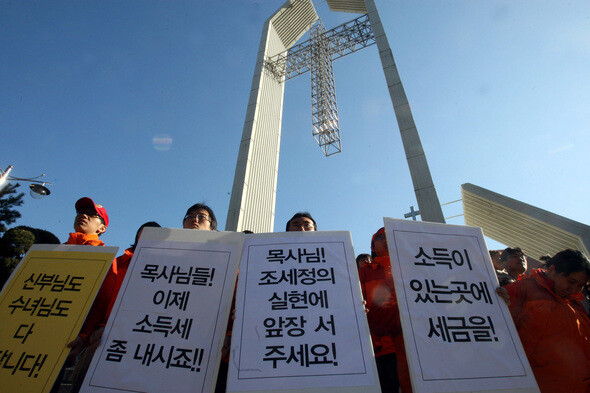hankyoreh
Links to other country sites 다른 나라 사이트 링크
[Editorial] Don’t delay implementation of tax on religious workers

The tax on religious workers that is set to be implemented from January of next year is in danger of being suspended for another two years. On Aug. 9, 25 members of the National Assembly, including Democratic Party lawmaker Kim Jin-pyo, moved to amend the income tax law by including a suspension of the religious figure tax. The Christian Council of Korea and other conservative Protestant organizations have responded [to the proposed tax] by forming a task force to block the tax.
Kim led the motion to revise the income tax law, and, as the head of the governance planning advisory committee, he was also directly involved in the announcement of the move for equal taxes, which is one of the new administration’s intended 100 policy tasks.
30 citizen-led religious groups from the Suwon area in Gyeonggi-do held a demonstration in front of Kim’s office on Aug. 16 in response to the Assembly member’s contradictory behavior.
“If you look at the enforcement decree, a considerable number of religious workers receive tax exemption benefits, and the religious workers who are having a hard time would be able to benefit from welfare like earned income tax credit, so why are they putting this off?” the protesting groups demanded to know.
Tax authorities report that about 46,000 religious workers would be affected by the tax revisal, and the amount of taxes that would be collected are estimated at a mere 10 billion won (USD $8.8 million), which is almost nothing compared to the overall amount of taxes collected. This means that, in actuality, the tax burden placed on most religious workers would be negligible. Consequently, major religious orders like the Catholic Church and the Buddhists and even many Protestant pastors are in favor of the tax. The only ones who oppose the tax are the pastors of large churches.
Korea has an especially high number of large churches. Out of the 50 most highly attended churches in the world, 24 are in Korea. Many of the head pastors at these churches receive annual income that rivals that of a large company’s CEO. But devotees who attend a church with over 2,000 members make up a mere 1.7% of all Protestants. However, the pastors of these large churches have pressed their church organizations into action against the religious figure tax, misleading the public into believing that they speak for all Protestants. Some politicians, too, have taken up the cause. Kim is an elder at Suwon Central Baptist Church and the leader of the Democratic Party’s Christian group.
Korea is the only country out of all OECD member countries that does not tax religious workers. Public opinion also favors the tax. According to a Research View survey conducted in May, 83% of those surveyed stated that the tax on religious workers needed to be implemented starting in January of next year.
Given the issues that have arisen from the financial corruption of head pastors at large churches, the religious workers income tax is genuinely needed to foster financial transparency in Korean churches. The Protestant Reformation took place 500 years ago. In order to bring about a Protestant Reformation in Korea, the new tax must be promptly implemented.
Please direct questions or comments to [english@hani.co.kr]

Editorial・opinion
![[Column] Park Geun-hye déjà vu in Yoon Suk-yeol [Column] Park Geun-hye déjà vu in Yoon Suk-yeol](https://flexible.img.hani.co.kr/flexible/normal/500/300/imgdb/original/2024/0424/651713945113788.jpg) [Column] Park Geun-hye déjà vu in Yoon Suk-yeol
[Column] Park Geun-hye déjà vu in Yoon Suk-yeol![[Editorial] New weight of N. Korea’s nuclear threats makes dialogue all the more urgent [Editorial] New weight of N. Korea’s nuclear threats makes dialogue all the more urgent](https://flexible.img.hani.co.kr/flexible/normal/500/300/imgdb/original/2024/0424/7317139454662664.jpg) [Editorial] New weight of N. Korea’s nuclear threats makes dialogue all the more urgent
[Editorial] New weight of N. Korea’s nuclear threats makes dialogue all the more urgent- [Guest essay] The real reason Korea’s new right wants to dub Rhee a founding father
- [Column] ‘Choson’: Is it time we start referring to N. Korea in its own terms?
- [Editorial] Japan’s rewriting of history with Korea has gone too far
- [Column] The president’s questionable capacity for dialogue
- [Column] Are chaebol firms just pizza pies for families to divvy up as they please?
- [Column] Has Korea, too, crossed the Rubicon on China?
- [Correspondent’s column] In Japan’s alliance with US, echoes of its past alliances with UK
- [Editorial] Does Yoon think the Korean public is wrong?
Most viewed articles
- 1‘We must say no’: Seoul defense chief on Korean, USFK involvement in hypothetical Taiwan crisis
- 2[Reportage] On US campuses, student risk arrest as they call for divestment from Israel
- 3[Column] Park Geun-hye déjà vu in Yoon Suk-yeol
- 4‘Weddingflation’ breaks the bank for Korean couples-to-be
- 5Korea sees more deaths than births for 52nd consecutive month in February
- 6N. Korean delegation’s trip to Iran shows how Pyongyang is leveraging ties with Moscow
- 7Amnesty notes ‘erosion’ of freedom of expression in Korea in annual human rights report
- 8Will NewJeans end up collateral damage in internal feud at K-pop juggernaut Hybe?
- 9N. Korean hackers breached 10 defense contractors in South for months, police say
- 10[Guest essay] The real reason Korea’s new right wants to dub Rhee a founding father